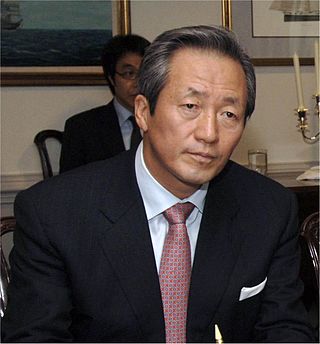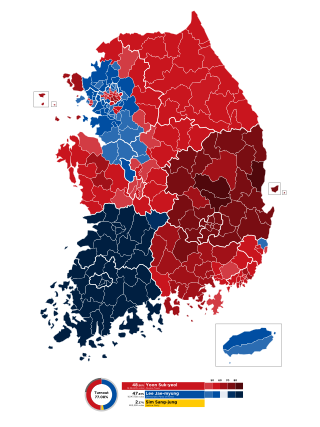The Liberty Korea Party (Korean: 자유한국당) was a conservative political party in South Korea that was described variously as right-wing, right-wing populist, or far-right. Until February 2017, it was known as the Saenuri Party, and before that as the Hannara Party from 1997 to 2012, both of which are still colloquially used to refer to the party. The party formerly held a plurality of seats in the 20th Assembly before its ruling status was transferred to the Democratic Party of Korea on 27 December 2016, following the creation of the splinter Bareun Party by former Saenuri members who distanced themselves from President Park Geun-hye in the 2016 South Korean political scandal.
The Korean Teachers and Education Workers Union, also known as Jeongyojo, is a labor union of teachers in South Korea. The organization has 77,000 members among the 360,000 public and private school teachers in the country.

Park Geun-hye is a South Korean politician who served as the 11th president of South Korea from 2013 to 2017. Park was the first woman to be elected president of South Korea, and also the first woman to be popularly elected as a head of state in East Asia. She is also the first South Korean president to be born after the founding of South Korea. Her father, Park Chung Hee, was president from 1963 to 1979, serving five consecutive terms after he seized power in 1961.

Lee Myung-bak, often referred to by his initials MB, is a South Korean businessman and politician who served as the 10th president of South Korea from 2008 to 2013. Before his presidency, he was the CEO of Hyundai Engineering and Construction, and the mayor of Seoul from 2002 to 2006.

Chung Mong-joon or Chung Mong Joon is a South Korean businessman and politician. He is the sixth son of Chung Ju-yung, founder of Hyundai, the second-largest South Korean chaebol before its breakup in 2003. He remains the controlling shareholder of a Hyundai offshoot, Hyundai Heavy Industries Group, parent of the world's largest shipbuilding company. He is also the chairman of the board of the University of Ulsan and Ulsan College in Ulsan, South Korea. He is the founder and the honorary chairman of The Asan Institute for Policy Studies. He was vicepresident of FIFA and president of the South Korean football association.

Presidential elections were held in South Korea on 19 December 2007. The election was won by Lee Myung-bak of the Grand National Party, returning conservatives to the Blue House for the first time in ten years. Lee defeated Grand Unified Democratic New Party nominee Chung Dong-young and independent Lee Hoi-chang by a nearly 2-to-1 margin, the largest since direct elections were reintroduced in 1987. It also marked the first time a president-elect in Korea was under investigation by a prosecutor. Voter turnout was 63%, an all-time low according to the National Election Commission.
Moon Kook-hyun is a South Korean politician who served as the leader of the Creative Korea Party. Before entering politics, he was a well-known business manager and civil environmental campaigner in South Korea.

The Supreme Prosecutors' Office of the Republic of Korea (SPO) is a governmental prosecutor organization in South Korea and is run under the Ministry of Justice. As a national representative of prosecutors, the Office works with the Supreme Court of Korea and below.

The Lee Myung-bak government was the fifth government of the Sixth Republic of South Korea. It took office on 25 February 2008 after Lee Myung-bak's victory in the 2007 presidential elections. Most of the new cabinet was approved by the National Assembly on 29 February. Led by President Lee Myung-bak, it was supported principally by the conservative Saenuri Party, previously known as the Grand National Party. It was also known as Silyong Jeongbu, the "pragmatic government", a name deriving from Lee's campaign slogan.
The Seoul Free Lunch Referendum was a referendum held on 24 August 2011, on the subject of free school meals in the schools around the Seoul Metropolitan Area. Then-mayor of Seoul, Oh Se-hoon, proposed to provide a limited free meal service to the 30% of the impoverished children in Seoul, but the Democratic Party proposed to make the free meal service to every child in Seoul starting from younger elementary school children and gradually to middle school children. This has become the cause of Oh Se-hoon's action to make the final decision of the policy through a referendum. The referendum was later rejected due to the low voter turnout of 25.7%, significantly lower than the required turnout of 33.3%. The low voting rate contributed to Oh Se-hoon's resignation from the mayoralty of Seoul.

Presidential elections were held in South Korea on 19 December 2012. They were the sixth presidential elections since democratization and the establishment of the Sixth Republic, and were held under a first-past-the-post system, in which there was a single round of voting and the candidate receiving the highest number of votes was elected. Under the South Korean constitution, a president is restricted to a single five-year term in office. The term of the then incumbent president Lee Myung-bak ended on 24 February 2013. According to the Korea Times, 30.7 million people voted with turnout at 75.8%. Park Geun-hye of the Saenuri party was elected the first female South Korean president with 51.6% of the vote opposed to 48.0% for her opponent Moon Jae-in. Park's share of the vote was the highest won by any candidate since the beginning of free and fair direct elections in 1987 and the first such election in which any candidate won a majority. Moreover, as of the 2022 election, this is the latest South Korean presidential election in which the winning candidate won an absolute majority of the vote.

Hong Joon-pyo, also spelled as Hong Jun-pyo, is a South Korean politician and former prosecutor who has served as the mayor of Daegu since 2022. He previously served as the governor of South Gyeongsang Province, a member of the National Assembly for five terms, and the party leader of the conservative Grand National Party in 2011 and its successor incarnation the Liberty Korea Party from 2017 to 2018.
Lee Sang-don is a South Korean legal scholar and a conservative liberal political activist. His liberal philosophy was influenced by American conservatism and neoconservatism, but he is critical of South Korean conservatism. He currently works as a professor at Chung-Ang University. He is a conservative pundit well known for expressing criticisms towards the Lee Myung-bak government. He received criticisms from a group of pro-Lee Myung-bak lawmakers for participating in the restructure of the Saenuri Party in the past due to his distance with Lee Myung-bak.
The DDoS attacks during the October 2011 South Korean by-election were allegedly two separate distributed denial-of-service (DDoS) attacks that occurred on October 26, 2011. The attacks, which took place during the October 2011 Seoul mayoral by-election, targeted the websites of the National Election Commission (NEC) and then-mayoral candidate Park Won-soon. Investigators assert that the attacks were carried out in hopes of suppressing young voters, to the benefit of the Grand National Party. An aide of Grand National Party legislator Choi Gu-sik was found responsible for the attacks.

Jun-seok Andy Lee is a South Korean politician who served as party leader of the conservative New Reform Party since January 2024.

Squad 38 (Korean: 38사기동대) is a South Korean television series starring Ma Dong-seok, Seo In-guk and Choi Soo-young. It aired on cable network OCN on Fridays and Saturdays at 23:00 (KST) for 16 episodes from June 17, 2016 to August 6, 2016.

Lee Ki-taek was a South Korean politician and parliamentarian.

Presidential elections were held in South Korea on 9 March 2022. Under the South Korean constitution, presidents are restricted to a single five-year term, meaning that incumbent president Moon Jae-in was ineligible to run for a second term. Opposition candidate Yoon Suk Yeol of the People Power Party won the election, defeating candidate Lee Jae-myung of the incumbent Democratic Party.

Park Heong-joon is a South Korean journalist, educator and politician. He was a former professor of the Sociology Department and Graduate School of International Studies at Dong-a University from 1 September 1991 to 12 March 2021.

The 2021 South Korean by-elections were held in South Korea on 7 April 2021. The National Election Commission announced on 2 March 2021, that the by-elections would be held for 21 public offices or electoral districts, including 2 Metropolitan mayors, 2 Municipal mayors, 8 Metropolitan Council constituencies, and 9 Municipal Council constituencies. Candidate registration ran from 18 to 19 March, and the list of candidates was confirmed on 26 March.













